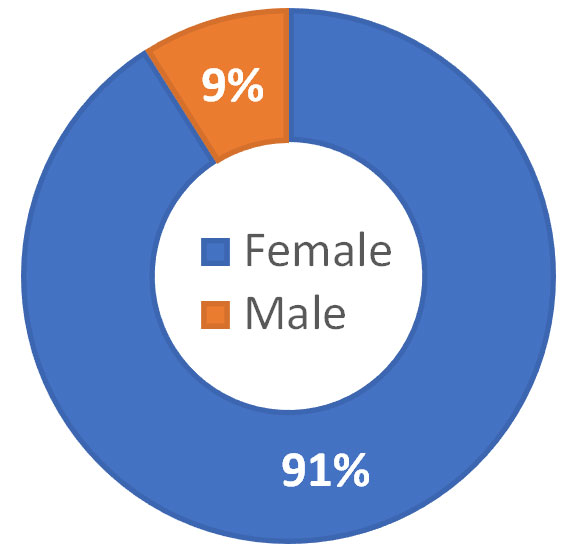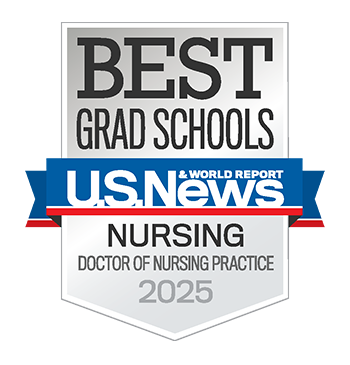DNP: Pediatric Dual Primary/Acute Care Nurse Practitioner
Need your questions answered?
OVERVIEW
Meet the growing need for pediatric nurses
Become a DNP-prepared Dual Pediatric Primary/Acute Care Nurse Practitioner or Pediatric Primary Care Nurse Practitioner, while taking advantage of the unparalleled resources found only at Johns Hopkins. Graduates will be prepared to take national certification examinations through the Pediatric Nursing Certification Board (PNCB).
In addition to advanced clinical training, the DNP provides the expertise needed to develop, evaluate, advocate, and transform health care through leadership, innovation, and evidence-based improvements at the organizational and systems levels. DNP graduates remain in practice, leading cross-professional teams to advance informed, high-quality healthcare.
The knowledge, skills, and abilities to lead such change are developed across the program and demonstrated through scholarly work that addresses meaningful healthcare improvement. This includes the DNP Project Scholarly work, which establishes each graduate as a Hopkins Nursing clinical scholar.
Program Details
Tuition & Fees
Estimated Tuition Cost: $2,057 per credit See Cost of Attendance Details
Financial Aid: There are numerous options for financing your education including grants, scholarships, federal loans, and employment programs. Learn more.
Upcoming Application Deadlines
Fall entry: Nov 1 and Jan 15
Requirements
Admission Criteria
- Bachelor of Science in Nursing Degree or an entry-level nursing master’s degree from an ACEN or CCNE accredited college or university or an equivalent degree from a comparable foreign institution
Scholastic GPA of at least 3.0 on a 4.0 scale
Applicants must submit evidence of current nursing license from an authorized state
One year of full-time pediatric RN experience in an acute care setting engaged in the direct care of physiologically unstable pediatric patients within an acute care environment (critical care, intermediate care, Level 1 pediatric ED, stepdown, pediatric med-surg, hem-onc preferred) required by the start of the program.
- Pediatric Advanced Life Support (PALS) certification
Three letters of recommendation (both academic and professional references; check FAQs for detailed guidance on completing this requirement)
Official Transcripts (from all previous colleges/universities)
Current Resume /CV (check FAQs for detailed guidance on completing this requirement)
Goal statement
GRE scores are accepted but not required
Interview with faculty (if moved forward by admissions committee)
Prerequisites
Undergraduate Statistics * Take at Hopkins Nursing. Course must be completed at a regionally accredited college or university with a letter grade of B or better. Grade of B- will not be accepted.
Students are required to maintain current licensure throughout the program. Additional RN licenses in surrounding states may be necessary to secure a clinical rotation. Where applicable, a current unencumbered compact (multistate) license will substitute for a single state license. Nursing licensure costs are the responsibility of the student.
* Topics should include correlation and linear regression; experimental design such as t-tests, analysis of variance and chi-square; suggested departments: psychology, sociology, education, biology, and mathematics. Statistics courses offered by business, management, and economics departments are typically more theory-based and lack the experimental design component.
State-Specific Information For Online Programs
Students currently cannot conduct clinical activities in Louisiana and New York. Johns Hopkins University is approved by the Washington State Board of Nursing to conduct practice experiences in the state of Washington for Washington residents. For more information, please contact an admissions representative. Students should be aware of additional state-specific information for online programs.
Student Sponsorship
This program does not qualify for F-1 or J-1 student sponsorship. Legal Permanent Residents and non-immigrants who are otherwise physically present in the U.S. and in a status that allows for full or part-time study, may pursue this program
DNP Advanced Practice profile based on Fall 23 cohort
* The profile encompasses all DNP NP tracks.
32%
Underrepresented Minority

91% Female/9% Male
29%
First Generation
16
Countries Represented
32
States Represented
30
Average Age
3
Average Years Nursing Experience
Curriculum
This program is offered in the online with course immersions format. Program may be completed in 76 credits, 960 clinical hours and 160 project practicum hours. Please note below the semesters in which an onsite visit is required.
Plan of Study
For Current Students Admitted Fall 2023 and prior, please reference your Plan of Study.
3 Year Plan
* Indicates a semester with a required onsite immersion.
Pharmacology for Advanced Practice Part I (2)
Advanced Physiology/Pathophysiology Part I (2)
Advanced Health Policy (2)
Health Promotion and Disease Across the Lifespan (2)
Application of Biostatistical Methods for Evidence-Based Practice (2)
Pharmacology for Advanced Practice Part II (2)
Advanced Physiology/Pathophysiology Part II (2)
Human Growth, Development and Supervision Birth through Adolescence (2)
- Diagnostic Reasoning I- Newborn and Young Child: Wellness, Nutrition. and Developmental Surveillance in Pediatric Primary Care (3)
- Advanced Health Assessment and Measurement for Advanced Practice Nurses (3) *
Diagnostic Reasoning II- Common Acute Health Conditions in Pediatric Primary Care (3)
Application of the Research Process to Evidence-Based Practice (2)
- Clinical Management I Pediatric Nurse Practitioner (1.5, 120cl)
- Diagnostics and Procedures Didactic (1)
Diagnostic Reasoning III -Children and Adolescents: Wellness, Behavioral/Mental Health, and Gender/Reproductive Health in Pediatric Primary Care (3)
Clinical Management II: Pediatric Nurse Practitioner (2, 160cl) *
Healthcare Finance for Advanced Nursing Practice (2)
Organizational and Systems Leadership for Quality Healthcare (2)
Diagnostic Reasoning IV: Chronic, Complex, and Multi-System Illnesses in Pediatric Primary Care (3)
Clinical Management III: Pediatric Nurse Practitioner (2, 160cl)
Scholarly Problem Discovery and Foundations of Nursing Leadership in Healthcare (2.5)
Scholarly Problem Discovery and Foundations of Nursing Leadership in Healthcare Practicum (0.5, 40hrs)
- Inquiry for Scholarly Practice (3)
Advanced Clinical Data Management for Evidence-Based Practice and Performance Improvement (2)
Translation of Evidence for Advanced Nursing Practice (1)
Pediatric Acute Care Practicum I (1.5, 120cl)
Evidence-Based Practice and Research Translation in Healthcare (2.5)
- Evidence-Based Practice and Research Translation in Healthcare Practicum (0.5, 40hrs)
Advanced Topics for the Acute Care Pediatric Nurse Practitioner I (3)
- Pediatric Acute Care Practicum II (2.5, 200cl) *
Advanced Applications of Information Technology in Healthcare Delivery (2)
- Health Policy, Advocacy, and Legislation Transformation in Healthcare (1.5)
Health Policy, Advocacy, and Legislation Transformation in Healthcare Practicum (0.5, 40hrs)
Advanced Topics for the Acute Care Pediatric Nurse Practitioner II (3)
Pediatric Acute Care Practicum III (2.5, 200cl) *
Clinical Data Management and Analyses (2)
Quality, Safety, and Systems Improvement and Dissemination in Healthcare (1.5)
- Quality, Safety, and Systems Improvement and Dissemination in Healthcare Practicum (0.5. 40hr)
Curriculum, credit hours, and sequencing are subject to change.
** Transfer Credits from the JHSON MSN (Entry into Nursing) Program to the DNP Advanced Practice Track can vary based on current curriculum & start date.
*** A minimum of 1000 clinical/practicum hours is required for DNP.
****Transfer of credit is granted on an individual basis. Please see the transfer of credit policy and complete the form to make a request.
Engage with Us
Join us soon for a tour, on-campus event or a virtual visit.
Request Information
Speak with Admissions to learn more about our programs.
Virtual Info Sessions
See recordings of some of our recent virtual info sessions.
Tuition & Other Costs
Financial aid
View the costs for the DNP Advanced Practice Program.
2025-2026
Scholarships & Grants: Grants are awards based on financial need that do not have to be repaid. Many students also benefit from scholarships and awards based on merit. Learn more.
Loans: Many students will avail themselves of loans to help finance their School of Nursing education. If necessary, we encourage you to borrow only what is absolutely essential to cover your educational costs. Learn more.
Employment: Many students locate part-time employment to help pay education expenses. Numerous positions are available on campus and within various community based organizations. These jobs provide students with opportunities to gain practical work experience. Most positions are funded through the Federal Work-Study Program. Learn more.
Frequently Asked Questions
At least one letter should come from a recent or current direct supervisor/manager (the person who is responsible for your performance evaluation)
At least one letter should come from an academic faculty member who can speak to your ability to successfully complete a demanding graduate level academic and clinical program.
The third letter can come from a second academic faculty member or an individual in a leadership position who can speak to your clinical abilities.
Personal references from colleagues, friends, or family members do not meet the requirement.
If you are unable to provide one of the reference letters above, please upload a statement of explanation to your application.
Please include the following information in your resume or CV:
- Work experience (include dates, sites and locations; paid and unpaid; any residency participation)
- Should discuss the ages, level of acuity, and typical diagnoses of patients cared for.
- Education Background
- Scholarly activities (research, presentations, publications, honors, awards)
- Professional activities (leadership, certifications, professional organization membership, service on committees)
- Community Service/Volunteerism
Clinical practicum experiences are determined by the student’s area of focus, student interest/experience, site and preceptor availability, and the student’s programmatic needs. The student works collaboratively with the Track Director and the Clinical Placement Team to request sites and identify preceptors, with final approval by the Track Director. Following an orientation to the electronic software system, the student will be responsible to complete clinical requests and upload required school and site compliance documentation by the due date. The due date is prior to the semester that includes a clinical course. Students will be working with the Clinical Placement Team throughout the course of their program. The Clinical Placement Team participates in orientation, advising sessions, and on-site immersions. The student is encouraged to work collaboratively and proactively with the Clinical Placement Team. An all-hands on approach yields optimal preceptor opportunities. Unauthorized states for clinicals include LA and NY. Admitted students who decide to enroll will be required to sign the “Student Expectations in the Clinical Placements Process” document prior to their first term in the program. For more information on Clinical Placement Services, visit https://nursing.jhu.edu/clinical-placement/.





